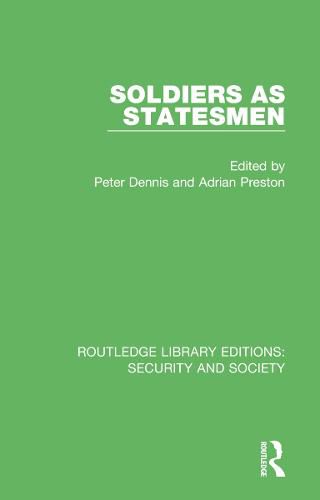Readings Newsletter
Become a Readings Member to make your shopping experience even easier.
Sign in or sign up for free!
You’re not far away from qualifying for FREE standard shipping within Australia
You’ve qualified for FREE standard shipping within Australia
The cart is loading…






‘The Duke is a soldier - a bad education for a statesmen in a free country’. Sir Walter Scott’s fear of the political soldier has long been part of Western political life. Yet although many countries would have preferred to keep the military out of politics few have been successful.
Originally published in 1976, this book examines the careers of five distinguished twentieth century soldiers and assesses their contribution as statesmen. Hindenburg, Byng, Franco, Eisenhower and De Gaulle all came into political life in different circumstances, but none did so in the name of the profession or to establish a praetorian state. Each was a professional soldier who found himself drawn into the political arena. Each of these essays illuminates one aspect of the range of political, sociological and historical issues which now surround the interrelationship of civil and military. At a time when the tensions of democracy, both internally and externally, impose increasing pressure on the role of the military in society it is important to study the history of soldiers-as-statesmen.
$9.00 standard shipping within Australia
FREE standard shipping within Australia for orders over $100.00
Express & International shipping calculated at checkout
‘The Duke is a soldier - a bad education for a statesmen in a free country’. Sir Walter Scott’s fear of the political soldier has long been part of Western political life. Yet although many countries would have preferred to keep the military out of politics few have been successful.
Originally published in 1976, this book examines the careers of five distinguished twentieth century soldiers and assesses their contribution as statesmen. Hindenburg, Byng, Franco, Eisenhower and De Gaulle all came into political life in different circumstances, but none did so in the name of the profession or to establish a praetorian state. Each was a professional soldier who found himself drawn into the political arena. Each of these essays illuminates one aspect of the range of political, sociological and historical issues which now surround the interrelationship of civil and military. At a time when the tensions of democracy, both internally and externally, impose increasing pressure on the role of the military in society it is important to study the history of soldiers-as-statesmen.